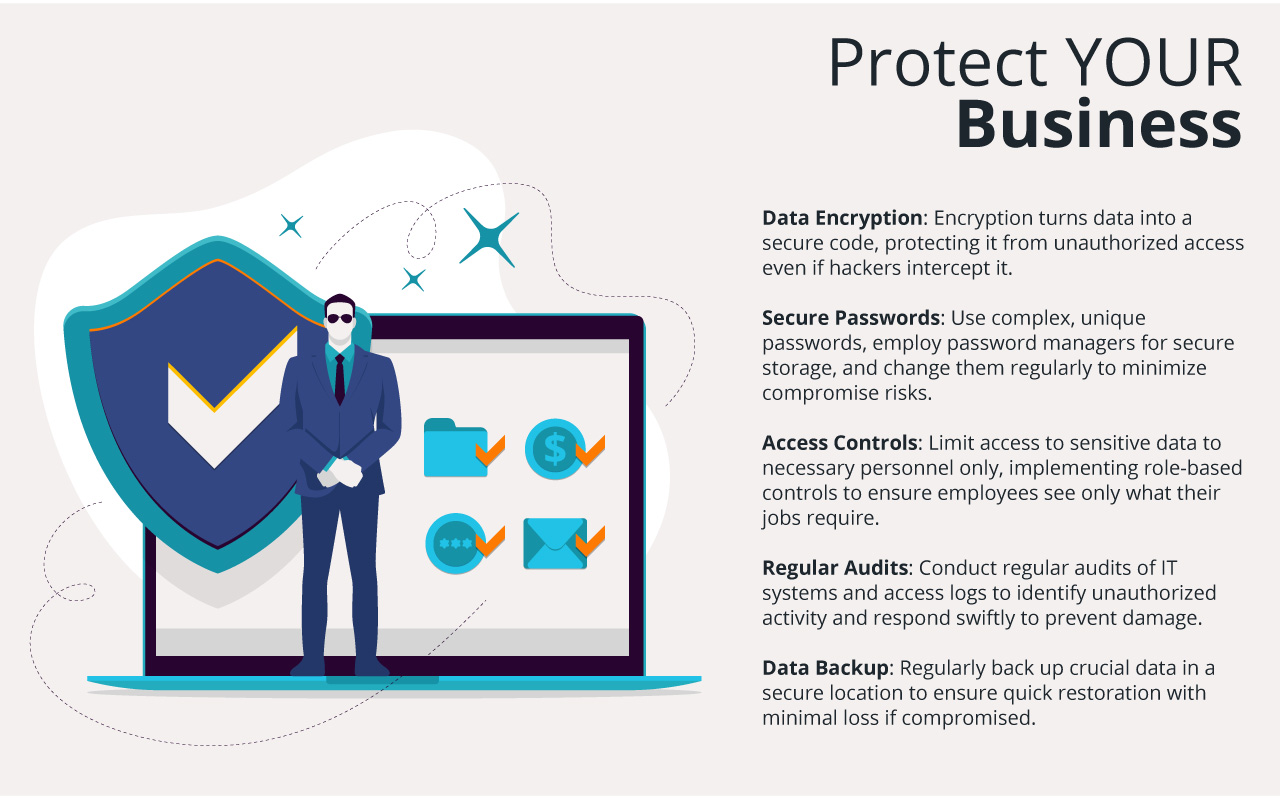Cybersecurity is more important than ever for businesses of all sizes. Cyber threats are constantly evolving, and protecting our sensitive data has become a critical task. Hackers are looking for any opportunity to exploit weaknesses in our systems. Taking proactive steps to secure our information can help prevent devastating attacks and keep our business running smoothly.
When we talk about cybersecurity, we are not just focusing on preventing attacks. It’s also about ensuring business continuity and minimizing downtime. A cyber attack can bring our operations to a halt, leading to lost revenue and productivity. By implementing robust security measures, we can maintain our business’s health even in the face of potential threats.
Another key aspect of cybersecurity is building trust with our customers. In today’s world, customers are more aware of data privacy issues and want assurance that their information is safe. Providing strong cybersecurity measures fosters this trust. By safeguarding their data, we show them that we value their privacy and are committed to protecting their information.
In this article, we will explore how to protect sensitive data, ensure business continuity, build customer trust, and implement effective cybersecurity strategies. With these steps, we can create a safer environment for our business and our customers. Let’s dive into these essential topics and learn how to keep our business secure.
Protecting Sensitive Data from Cyber Threats
Protecting sensitive data is a top priority for any business. Here are some effective ways to secure our data from cyber threats:
- Data Encryption: Encryption converts data into a code that only authorized users can access. Encrypting sensitive information ensures that even if hackers get hold of the data, they can’t read it without the encryption key.
- Secure Passwords: Use complex and unique passwords for all accounts. Encourage the use of password managers to store and manage these passwords securely. Change passwords regularly to reduce the risk of them being compromised.
- Access Controls: Limit access to sensitive data to only those who need it. Implement role-based access controls, so employees see only the data necessary for their specific job functions.
- Regular Audits: Conduct regular audits of our IT systems and data access logs. This helps identify any unauthorized access or unusual activity, allowing us to act quickly before any damage is done.
- Data Backup: Regularly back up crucial data and store it in a secure location. This ensures that if data is compromised, we can quickly restore it without significant loss.
By taking these steps, we can safeguard our sensitive data from potential cyber threats and protect the integrity of our business information.
Ensuring Business Continuity and Minimizing Downtime
Continuity of operations is vital for any business. An effective cybersecurity strategy includes measures to minimize downtime and ensure business continuity:
- Business Continuity Planning (BCP): Develop a detailed plan that outlines how to maintain operations during and after a cyber attack. This plan should include identifying critical business functions and developing backup strategies for each.
- Disaster Recovery Plan (DRP): A disaster recovery plan focuses on restoring IT systems and data after a cyber attack. This includes having backup servers and data storage that can be quickly accessed if the primary systems fail.
- Regular Drills: Conduct regular drills to test our business continuity and disaster recovery plans. Practice helps ensure everyone knows their role and can act swiftly in case of an attack.
- Redundant Systems: Implement redundant systems for critical business operations. Having backup systems ensures that even if one system is compromised, another can take over, minimizing downtime.
- Communication Protocols: Establish clear communication protocols for informing employees, customers, and partners during a crisis. Prompt and transparent communication helps maintain trust and keeps everyone informed about the steps being taken to resolve the issue.
These measures ensure that even during a cyber attack, our business can continue to function with minimal disruption. Planning and preparation are key to maintaining operations and recovering swiftly.
Conclusion
Cybersecurity is an essential part of running a successful business. Protecting sensitive data, ensuring business continuity, and building trust with customers require a strong and proactive cybersecurity strategy. Understanding different types of cyber threats and recognizing the signs early can help us respond quickly and effectively.
Preventative measures like data encryption, secure passwords, access controls, regular audits, and data backups can significantly reduce the risk of cyber attacks. Additionally, having a solid business continuity and disaster recovery plan ensures that our operations can continue with minimal downtime even if an attack occurs.
Educating ourselves and our employees about cybersecurity is crucial in this effort. By staying informed and prepared, we create a resilient business environment that can withstand cyber threats.
For professional help strengthening your cybersecurity, contact The Saturn Partners. Our expert team can provide the guidance and cybersecurity services you need to protect your business. Don’t wait until it’s too late—reach out to us today and take the first step towards a secure future.

